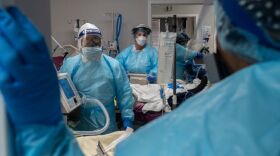
Sean McMinn
Sean McMinn is a data editor on NPR's Investigations team.
Based in Washington, D.C., McMinn reports stories in collaboration with journalists across NPR's network of member stations. He previously worked in the newsroom's News Apps/Visuals team.
McMinn came to NPR from CQ Roll Call, where he covered Congress and politics for three years as a data reporter. While there, he built interactives to help Americans better understand their government, and his reporting on flaws in FEMA's recovery programs led to the agency making changes to better serve communities struck by disaster. He also took part in an exchange with young professionals in North Africa and has spent time in Egypt and Tunisia teaching data visualization and storytelling.
Before that, McMinn taught multimedia journalism to interns through a fellowship with the Scripps Howard Foundation.
He is also an adjunct lecturer at Northwestern University's Medill School of Journalism and at American University.
McMinn is an alumnus of the National Press Foundation's Paul Miller Fellowship and has served as vice-chair at the National Press Club's Young Members Committee. He has also directed the Press Club's Press Vs. Politicians Spelling Bee fundraiser, which pits members of Congress against journalists to raise funds for the club's non-profit journalism institute.
McMinn is from Thousand Oaks, Calif. He holds a journalism degree with a statistics minor from California Polytechnic State University San Luis Obispo, where he was a reporter and editor on the student newspaper, Mustang News.
-
COVID-19 hospitalizations continue to strain U.S. hospitals in certain places, while the burden is easing up in other areas. Look up your local hospital to see how it's faring.
-
Hospitals are getting so crowded with COVID-19 patients that they're having to resort to workarounds to treat them all. Experts warn this may hamper doctors' ability to save lives.
-
An NPR analysis shows that the majority of counties with the highest COVID-19 death rates showed stronger support for Trump in 2020 than they did four years ago.
-
Data from more than 1,400 colleges, obtained by NPR, show that most colleges with in-person classes have no clear testing plan or are testing only students who believe they have the coronavirus.
-
Emerging data suggest that though people altered their habits during the first month of America's response to the pandemic, that cooperation has since leveled off and — eventually — decreased.
-
A candidate needs 1,991 delegates to become the Democratic Party's presidential nominee. Even after effectively securing the nomination in March, Joe Biden has spent months reaching the benchmark.

